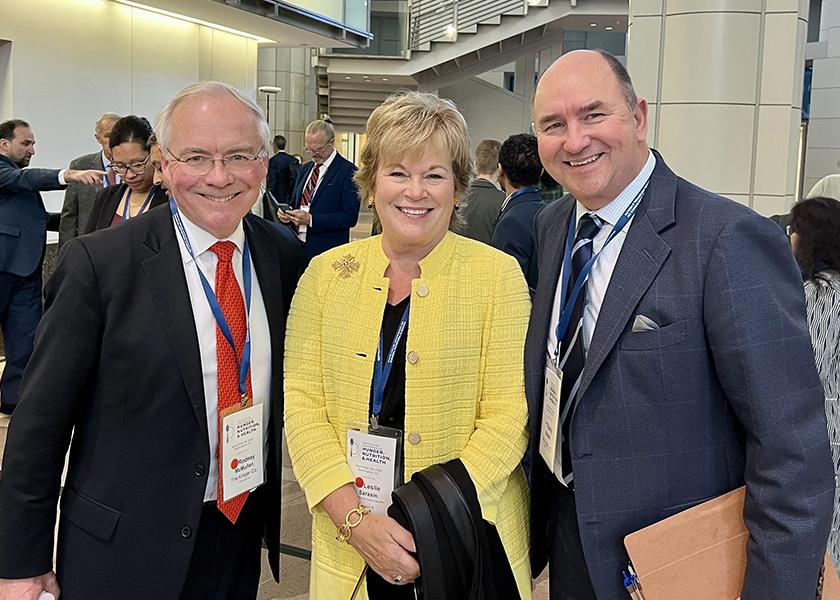FMI to fight hunger in 2023: Commits 2 billion donated meals

On Sept. 28, the Biden-Harris administration brought together food, health and wellness industry leaders to the White House Conference on Hunger, Nutrition and Health. FMI President and CEO Leslie Sarasin was among the leaders in attendance.
In the months leading up to the conference FMI, The Food Industry Association convened with its members to outline a set of commitments the food industry could support that address food and nutrition insecurity and provide Americans with resources to make informed choices about their eating patterns and overall health, said FMI.
FMI’s Jennifer Hatcher, chief public policy officer and senior vice president of government and public affairs, watched the D.C. conference from a viewing party with FMI colleagues.
The Packer recently spoke with Hatcher to learn her take on the conference as well as more about FMI’s commitment to end hunger, expand access and increase healthy eating.
Hatcher was buoyed watching the entire conference, excited for what comes next.
“We really want to put the commitments into action, make sure that our members are able to understand them and that we can try to help eliminate any barriers to achieving the commitments. I think we had we have some great wins,” she said.
Underpinning the White House Conference, the administration released a national strategy outlining how the federal government will end hunger, increase healthy eating and physical activity by 2030. The plan is organized around five main pillars:
- Improve food access and affordability
- Integrate nutrition and health
- Empower all consumers to make and have access to healthy choices
- Support physical activity for all
- Enhance nutrition and food security research
Hatcher believes the food industry is uniquely positioned to further the first three White House Conference pillars in particular.
Food donations that make a difference
Key to food access and food affordability, the first strategy pillar is food donations. “Food donation has always been a huge component of what we do,” Hatcher said. “I don’t think anyone has any idea around the work that goes into those donations, [and] how they’re tailored to the specific non-profit being donated to. You know, we don’t just send food somewhere. We find out what they need, and one part of our work is to share how that works.”
What’s more, communicating about food donations is half the battle, so FMI asks how many meals it needs to offer from the start.
"This allows us to convert dollars and pounds to meals, so we’re able to quantify it as a recognizable number," said Hatcher. "The amount of donations that are going to go to Florida, Georgia and South Carolina for hurricane relief is extraordinary. We’re capturing this and figuring out how to make it easier for nonprofits to get the specific items that they need.”
The number of meals FMI has committed to donate in 2023? Two billion, to be exact.
“It’s a huge number,” Hatcher said, “but it’s credible, and it’s going to make a difference.”
Related news: What You Need to Know About Biden's Hunger Conference
Expanding access and food-as-medicine programs
Additionally, FMI is focusing on new ways to expand food access and “make sure that underserved communities have access to nutritious and nutrient dense foods.” According to Hatcher, not only will FMI explore new approaches to serve communities in 2023, but FMI plans on “leveraging federal feeding and food-as- medicine programs.”
“It's one thing to give someone a card and say, ‘this card is good for XYZ,’ but if you don't have the back-end component to it, there's no way to ensure anything happens,” Hatcher said. “You've got to put parameters around it. We've got to make sure that in-store teams are aware of the [food-as-medicine] program and what they're trying to achieve. We also need to ensure that we have our registered dietitians and nutritionists engaged in this. FMI is going to spend 2023 looking at how we leverage the federal feeding programs and how we put some standardization around some of these food-as-medicine programs.
“We're really in the beginning stages of this,” Hatcher continued. “There are several companies that have been trying to design [food-as-medicine programs]. There are some that are on the on the creation side, and then there are some that are on the health and health insurance company’s side. What we really need to do is mash everyone together — mash the Silicon Valley creators, the nutritionists, dietitians and store folks with the health care [workers].
"We've seen efforts from both ends, and we're in the middle. And what we're saying is we need to bridge all of that together,” she said.
Banding together to collaborate is one overarching positive that has come out of the pandemic, says Hatcher, who saw that throughout these difficult years, individuals and small business owners across the food and fresh produce supply chains were reaching out and calling each other to source what they needed.
“The thing I’m most excited about is how well the industry is working together, all the way through from seed to supper,” Hatcher said.
FMI is ready and equipped to collaborate. While its roster of non-profits and partners is expansive, FMI’s charge coming out of the White House Conference is laser focused and hopeful about putting these ambitious plans into action in the coming year.







